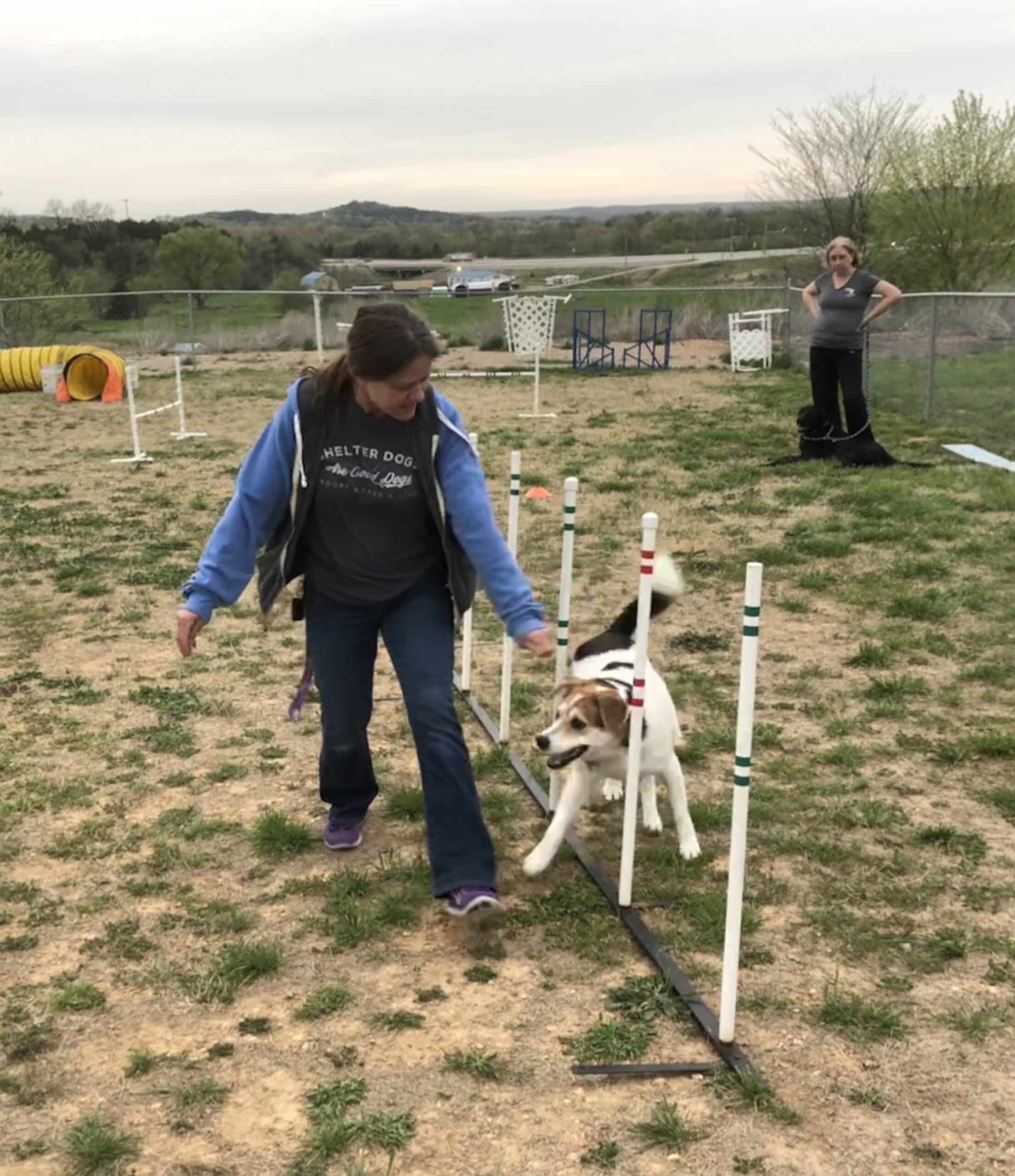Find a dog-training niche, such as working with dogs with behavioral issues, trick training or specific breed work. Then, join a professional dog-training organization and get as much experience in that sector as you can.

Rachel Brix is Fear Free Certified and both a certified dog trainer and behavior consultant. She became a dog trainer 14 years ago. Here, she works with her rescue dog, Emerson. © Rachel Brix
Written by: Rachel Brix, CBCC-KA, CPDT-KA, Fear Free Certified
Last Updated on January 25, 2024 by Dogster Team
Everywhere you look things have gone to the dogs! Earning a living as a dog trainer is fun and doable. Although the dog training industry remains unregulated, certification helps you stand out from your competition and offers many other benefits for networking, marketing and continuing education.

How to Become a Dog Trainer
While you’re considering certification, or working on completing it, here are the basic steps to become a dog trainer:
- Become versed in canine body language and emotions
- Shadow other dog trainers to get hands-on experience
- Find a qualified mentor. Look local for someone to show you the ropes in person. Focus on training facilities that use rewards-based methods. Avoid trainers who use language about “dominance,” “pack leadership,” offer “balanced training,” and advise “using corrections” to train dogs. Steer clear of those who use shock/e-collars. Try the directories on PPG’s Zip Code Search or CCPDT’s websites for both local and online options. Read the bios and reach out! Most trainers are happy to help newcomers to the profession.
- Volunteer for a rescue or shelter for more interaction with all dog breeds, sizes and personalities.
- Gather training supplies. For a start, here’s our list of the top 10 essential dog training supplies.
- Practice with your own dog, following our top training tips for beginners
- With permission, work with friends and family members’ dogs
- Read. Read. Get your paws on relevant dog-training related articles, books and studies. But, be picky. Read books whose authors have credentials and the books and materials have citations and credible sources. Get started at PPG and APDT.
- Look for local or online courses. Check out the aforementioned professional organizations’ and schools’ websites for online courses and webinars. Start with what piques your interest and branch out. There are a lot of affordable online conferences. Here are some to get you started.
- Narrow your focus on the types of training you’d like to do. Some types of training to consider are: basic manners, behavioral issues (i.e. aggression, over reactivity, phobias/compulsions, separation anxiety), trick training, sport training (i.e. agility, nose work, treibball, flyball, conformation) or working with certain breeds.
Rewards-based training is what modern dog training is about and the future of the profession. Be choosy about your study and mentor resources and select evidence-based practices.
- Join a professional organization, such as a Pet Professional Guild, Association of Professional Dog Trainers or International Association of Animal Behavior Consultants. These groups provide opportunities for continuing education, networking with other pet professionals and solidify your reputation as one who takes her profession seriously.
- Attend a dog training school such as Victoria Stilwell Academy, CATCH Academy, Karen Pryor Academy or Jean Donaldson’s Academy for Dog Trainers. Dog training schools provide foundational knowledge about dogs: the book smarts. Hands-on experience is a huge part of training, but bringing both knowledge and experience to the table when working with dogs helps create safe and successful encounters.
- Pursue certification through the Certification Council for Professional Dog Trainers or certification specific to a reputable training school.
How to start a dog training business

Once you’re educated and experienced, it’s time to zero in on the prize: your own business.
Before taking on your first client, get organized:
- Decide what type of training (listed above) your business will focus on. Some examples are basic manners, working with certain breeds or dogs with certain behavior issues. Finding a niche will make you a stand out and help develop and hone your skills
- Will you be hands-on, virtual or both?
- Choose a stand out business name
- Research and choose a legal business structure and complete necessary paperwork
- Get liability insurance
- Start petworking! Market and promote your services: Visit local veterinarians and other pet-related business, set up booths at local events/festivals and promote yourself on social media.
